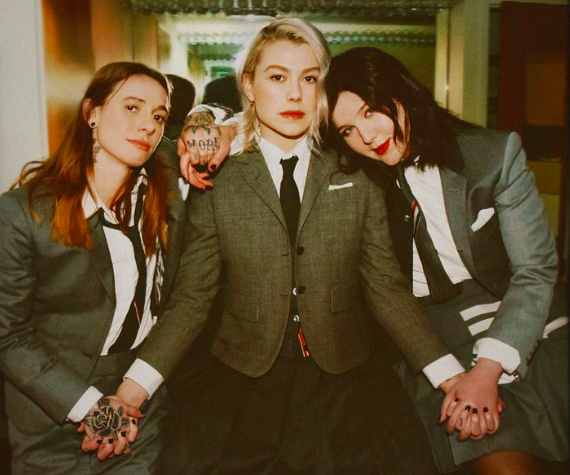The first time I heard boygenius was on a playlist my first girlfriend made for me. We communicated via playlists, sending songs back and forth that telegraphed our feelings. It reminded me of being a teen at the dawn of the internet, when I’d set my AIM away message to a Michelle Branch or Fiona Apple lyric I hoped my crush would see. boygenius’s “Bite the Hand,” from the group’s 2018 debut EP, was one of the last songs on this particular playlist. “I can’t love you like you want me to,” Lucy Dacus sang in her velvety alto, and my spine softened like room temperature butter, my heart stood at full attention. My mission was clear: Find out everything there is to know about boygenius.
I’m like this with music I love — intense, obsessive, willing to spend an embarrassing number of hours Googling origin stories and astrology charts. Still, my instant fascination with Boygenius felt different. One of the most popular supergroups in recent years, the band is composed of Dacus, Phoebe Bridgers, and Julien Baker, all of whom are successful solo indie artists, and all of whom identify as queer. Their brand of queer joy is thrilling and infectious; just check out their recent cuddle puddle at Coachella.Watch them play together once and you’ll understand the band’s sisterly magic. In their 2018 Tiny Desk Concert, all three members wear matching embroidered jackets and occasional goofy grins. They trade off solos (everyone is a frontwoman in boygenius) and come together for finely balanced harmonies that wash over you like a warm wave, a perfect encapsulation of their close-knit friendship. Their chosen family.
View this post on Instagram
I was 34 and in a longtime hetero marriage when I realized I was queer. This realization came to me in an instant — I was on a dance floor, looking at a woman I’d recently met, when the words Whoa, I really like her…I think I’m gay popped unbidden into my head. Though I’d long understood sexuality to be slippery and fluid, I was shocked to discover this about myself. Sure, I grew up Catholic, in small-town Oklahoma, and knew maybe two Democrats until I went to college. My pop culture intake was largely devoid of LGBTQ+ people. But still, I’d also gotten a gender studies-heavy liberal arts education, lived in Austin for ten years, and long ago swapped Catholicism for socialist feminism. I’d never even had a crush on a woman. I think you can find evidence of repressed queerness in my life, and I think you can also find evidence that my sexuality has evolved, as so many of our sexualities do. What I know now is this: None of us should ever have to explain something as mysterious and natural as desire.
Shortly after that night on the dance floor, I came out to my husband, and we eventually decided to open our marriage. I began dating the woman who introduced me to boygenius, the music providing the perfect soundtrack for my state of emotional upheaval and transition. The act of falling in lust, then love, with her was easy, though navigating my new relationship structure decidedly was not. Every night, I’d crawl into bed feeling like I’d failed someone: my husband, my girlfriend. But mostly myself.
A few months later, boygenius shared three new singles from their (then-upcoming) debut album. I couldn’t get enough, stalking around my city and listening to the songs on repeat, teenage-like angst rippling through my body. At that point, I felt lost and totally unsure of how to incorporate my queerness into my straight married life, despite coming out and dating a woman I loved. I remember hearing “True Blue” for the first time — “When you don’t know who you are / You fuck around and find out” — the winter air was knife-sharp, and I cried and cried.
By the time the album, The Record, was released, my world had shattered. I’d broken up with my girlfriend, having realized polyamory wasn’t going to be a satisfying way to access what I wanted. After many painful conversations, my husband and I made plans to separate, and the ensuing grief threatened to swallow me up. I wept constantly, curled up on the kitchen floor, muttering, “It’s okay, it’s okay, it’s okay,” in the most loving tone I could muster. I ate canned tuna and canned beans and drank my weight in boxed wine, and occasionally went to therapy. I also continued to listen to boygenius, and something akin to hope began to bloom inside of me, if only for the duration of the songs. Hope for future me, who’d trusted herself to make the right choice, even if she knew it meant breaking her own heart.
We hear this all the time, but that doesn’t take away from its pressing importance: representation matters. During the lowest points of my coming out journey thus far, listening to the exquisite sounds of three queer women making (yes) genius music together gave me a little more strength than I had before. I can’t help but feel sad for my younger self, who never got to see Lucy Dacus, Julien Baker, and Phoebe Bridgers on stage, singing in harmony about love in all its forms. But I’m extremely grateful for my 35-year-old self, who’s coming more into her own with every passing day — thanks in no small part to boygenius.


What Do You Think?